

Since the days of the Revolutionary War, America has fought to protect its secrets from internal spies. While most apprehended spies are caught and arrested within just a few years, many have managed to leak invaluable, highly classified information to foreign governments over lengthy espionage careers lasting many years and sometimes multiple decades. (In America and elsewhere, these are the most famous spies in history.)
To determine the worst cases of espionage in U.S. history, 24/7 Tempo reviewed data on espionage by Americans from the Defense Personnel and Security Research Center of the Department of Defense. Native- and foreign-born American spies were ranked based on how long they spied – the total time elapsed between the start date of their espionage activities (estimated in most cases) and the date of their arrest. (Currently, there are at least 14 Americans imprisoned for espionage.)
The motivation for espionage varies widely amongst the worst offenders. While money is a fine motive for any crime, most spies receive less than $10,000 for their activities, according to data compiled by the Department of Defense. Instead, many spies have turned coat in the name of ideology. James Clark, for example, is said to have developed communist sympathies while a student at the University of Wisconsin, inspiring him to provide East Germany with classified documents for a period of at least 10 years.
In other cases, acts of espionage may originate from sheer boredom, or intrigue for the sake of intrigue. Jeffrey Carney, who provided the Stasi police with over 100 top-secret documents while stationed as an Air Force specialist in West Germany, is characterized as a loner who defected after becoming disillusioned with military life.
Click here to read about the worst cases of espionage in U.S. history
Robert Hanssen, who perpetrated one of the most damaging acts of espionage in U.S. history selling secrets to the Russians from 1979 to 2001, is said to have been drawn by the theatricality of tradecraft, donning black turtlenecks reminiscent of the “golden age” of Cold War spies to conduct dead drops with his handler in his Washington D.C. suburb.
Whatever the motivation, espionage against the United States has had significant geopolitical impact, costing countless lives both directly and indirectly. One potential consequence of Larry Wu-tai Chin’s three-decade tenure as spy against the United States, for example, was to delay the end of the Korean War by a year, according to some experts. Information provided by Robert Hannsen to the Soviet Union and later Russia directly led to the execution of several U.S. assets, among other consequences.

25. Jeffrey Martin Carney
> Length of espionage activities: 8 years
> Start date: April 1983
> Arrest date: April 22, 1991
> Spied for: East Germany
Carney was a U.S. Air Force intelligence specialist who spied for East Germany during the Cold War. Throughout the 1980s, he provided the Stasi, East Germany’s secret police, with a variety of classified information. His espionage activities, which began when he was stationed in West Berlin, significantly compromised U.S. security. The U.S. Air Force Office of Special Investigations grew aware of Carney’s activities after the fall of the Berlin Wall in 1989 led to the declassification of many Stasi records, and apprehended him in 1991. Carney was sentenced to 38 years in prison.
[in-text-ad]
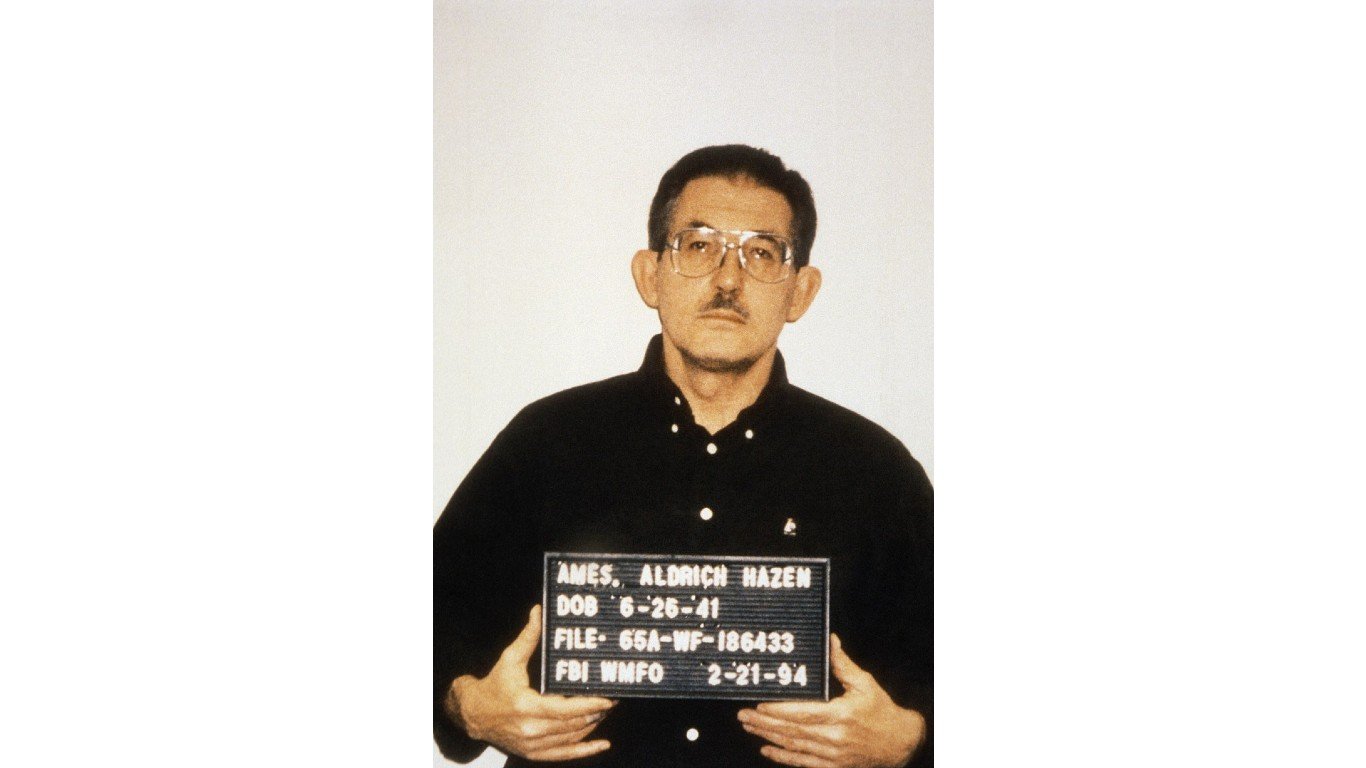
24. Aldrich Hazen Ames
> Length of espionage activities: 8 years, 11 months
> Start date: April 1985
> Arrest date: Feb. 21, 1994
> Spied for: Soviet Union
A CIA officer turned KGB mole, Ames was active during the latter half of the Cold War and for several years afterwards. From 1985 until his arrest in 1994, Ames provided the Soviet Union, and then Russia, with classified information that led to the compromise of at least 100 U.S. intelligence operations and the execution of several U.S. assets. His actions are considered among the most damaging in the history of U.S. intelligence.
23. Ali Abdelseoud Mohamed
> Length of espionage activities: 9 years
> Start date: 1989
> Arrest date: Sept. 10, 1998
> Spied for: Al Qaeda
Ali Mohamed was an Egyptian military officer who became a double agent for the United States and Al-Qaeda. After immigrating to the U.S., Mohamed worked as an FBI informant while secretly assisting Al-Qaeda with strategic planning and training. His activities included involvement in the 1993 World Trade Center bombing and the 1998 U.S. embassy bombings in East Africa. Mohamed’s dual roles weren’t fully understood until after his 1998 arrest, illuminating complexities in counterterrorism efforts.

22. David Sheldon Boone
> Length of espionage activities: 10 years
> Start date: 1988
> Arrest date: Oct. 10, 1998
> Spied for: Soviet Union
A former U.S. Army signals analyst, Boone was convicted for espionage-related activities in 1999. Between 1988 to 1991, while stationed in West Germany as the Cold War wound down, Boone sold classified documents to the Soviet Union, including a handbook detailing how the U.S. intended to wage nuclear war. He was arrested in 1998, and subsequently sentenced to 24 years and four months in federal prison.
[in-text-ad-2]

21. Subrahmanyam Kota
> Length of espionage activities: 10 years
> Start date: 1985
> Arrest date: Oct. 18, 1995
> Spied for: Soviet Union
In 1995, Kota – then president of the Boston Group computer consulting firm – was arrested for involvement in a spy ring that sold highly sensitive defense technology to the KGB from 1985 to 1990. In addition to selling stolen biotech material, Kota also sought to obtain information about mercury cadmium telluride missile detectors, the special coating used to make stealth fighters invisible to radars, and semiconductor components used in infrared missile-tracking systems. According to an FBI affidavit, Kota met with and passed along information to Russian agents in Bermuda, Portugal, Switzerland, Cyprus, and other foreign locations.

20. Jerry Alfred Whitworth
> Length of espionage activities: 10 years, 4 months
> Start date: Feb. 1975
> Arrest date: June 3, 1985
> Spied for: Soviet Union
Whitworth was a key figure in one of the most damaging espionage rings during the Cold War. A senior radio operator in the U.S. Navy, Whitworth was convicted in 1986 for selling classified information to the Soviet Union. He was part of the infamous “Walker Spy Ring”, led by John Anthony Walker Jr. (see No. 16), which operated for more than a decade. Whitworth’s actions reportedly compromised U.S. codes and put American national security at significant risk. He was sentenced to 365 years in prison for his crimes.
[in-text-ad]
19. Karel Koecher
> Length of espionage activities: 11 years, 10 months
> Start date: Feb. 1973
> Arrest date: Nov. 27, 1984
> Spied for: Czechoslovakia
Koecher was a Czechoslovakia-born intelligence officer who became a double agent for the CIA during the Cold War. He infiltrated the CIA in the 1960s and 1970s, becoming the first foreign spy to penetrate the agency at such a high level. Koecher’s espionage activities included transmitting highly classified information to the KGB. His double agent status was discovered in 1984, leading to his arrest and subsequent prisoner exchange between the U.S. and Czechoslovakia.
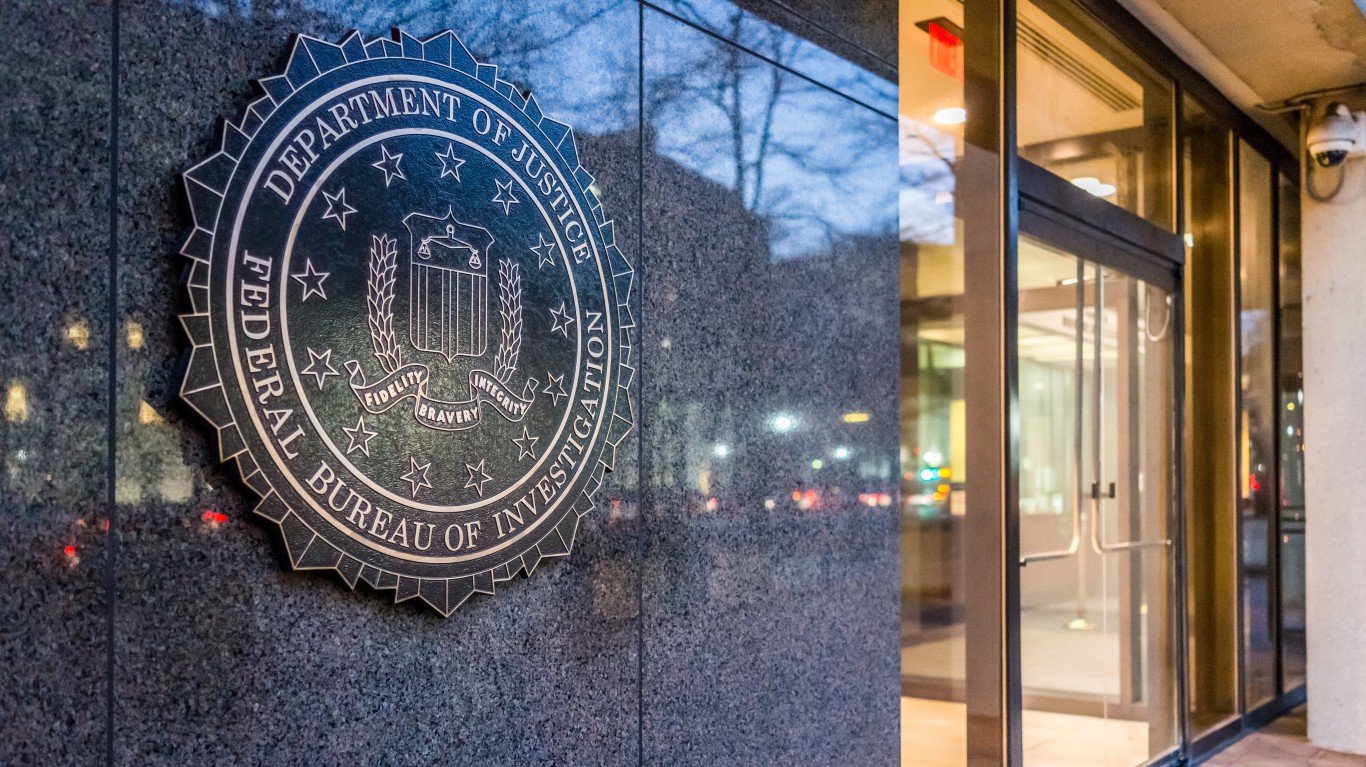
18. Katrina M. Leung
> Length of espionage activities: 13 years
> Start date: April 1990
> Arrest date: April 9, 2003
> Spied for: China
A prominent Chinese-American businesswoman, Leung was accused of working as a double agent for both the United States and China. She was recruited by the FBI in the 1980s to gather intelligence on China but was later found to have been secretly passing on sensitive information to the Chinese government. The case, discovered in the early 2000s, was considered one of the most damaging spy scandals in recent U.S. history.

17. Clyde Lee Conrad
> Length of espionage activities: 14 years
> Start date: 1974
> Arrest date: Aug. 23, 1988
> Spied for: Hungary, Czechoslovakia
Conrad, a non-commissioned officer in the U.S. Army, was accused of selling top-secret NATO defense plans and documents to the Hungarian and Czechoslovakian intelligence services from 1974 to 1988. His actions reportedly compromised U.S. and NATO military operations during the Cold War. Conrad was arrested in 1988 by West German authorities, tried and convicted in Koblenz, and sentenced to life imprisonment and a fine of over $1 million. He died of a heart attack in prison at the age of 50.
[in-text-ad-2]
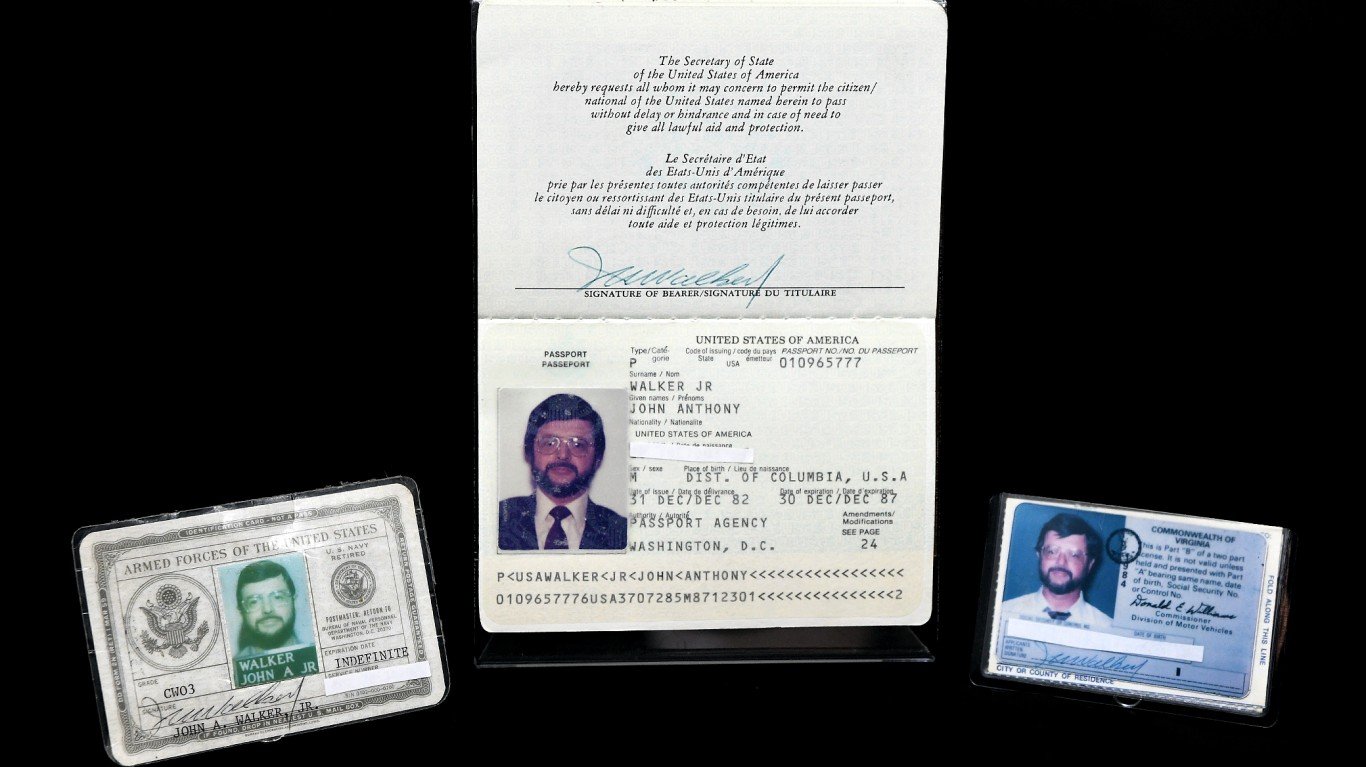
16. John Anthony Walker, Jr.
> Length of espionage activities: 17 years, 5 months
> Start date: Jan. 1968
> Arrest date: May 20, 1985
> Spied for: Soviet Union
John Anthony Walker Jr. was a U.S. Navy officer who sold classified military information to the Soviet Union. His espionage activities, which involved a spy ring including his son and brother, severely compromised U.S. security during the Cold War, allowing the Soviets to decipher over a million encrypted naval messages, allowing the Soviets to greatly improve their naval warfare capabilities. Walker’s ex-wife contacted the authorities about his activities, not realizing at the time that their son was also involved. After Walker and his co-conspirators were arrested and tried, all were sentenced to life in prison except the son, Michael, who received a 25-year sentence. Walker himself died in prison in 2014, a year before he would have been eligible for parole.

15. Amen Ahmed Ali
> Length of espionage activities: 19 years
> Start date: 1987
> Arrest date: Sept. 7, 2006
> Spied for: Yemen
Ali was arrested in Bakersfield, California, as the result of a long-term investigation by the FBI and local police departments. In a plea agreement entered several years later, Ali admitted to conspiring to act as an illegal agent on behalf of the Armed Forces Department of the Republic of Yemen since 1987. In his nearly two decades as a Yemeni spy, Ali conspired to export stolen documents and unlicensed U.S. military equipment – such as bulletproof vests, chemical protective suits, and night vision goggles – to Yemen.
[in-text-ad]

14. Ronald N. Montaperto
> Length of espionage activities: 21 years
> Start date: 1983
> Arrest date: Feb. 4, 2004
> Spied for: China
Montaperto is a former U.S. defense analyst who was convicted in 2006 of passing classified information to China. After several stalled investigations, the FBI was able to dupe Montaperto into admitting to providing Chinese military attaches with significant amounts of top secret information during a polygraph test for a faux job interview. According to U.S. officials, Montaperto’s activity may have partially resulted in China successfully evading an U.S. eavesdropping operation that had monitored the country’s links to illicit arms sales.

13. Ana Belen Montes
> Length of espionage activities: 21 years
> Start date: 1980
> Arrest date: Sept. 21, 2001
> Spied for: Cuba
A senior analyst at the U.S. Defense Intelligence Agency, Montes provided classified information to the Cuban Intelligence Directorate over 20 years, which included revealing U.S. military exercises and unmasking four U.S. spies. Montes was convicted of espionage and is serving a 25-year prison sentence.

12. James Clark
> Length of espionage activities: 21 years
> Start date: 1976
> Arrest date: Oct. 4, 1997
> Spied for: East Germany
In 1998, Clark was convicted on a charge of conspiracy to commit espionage and was sentenced to 12 years and seven months in prison. According to a report from the time of his conviction, Clark was recruited into spying through a leftist campus organization at the University of Wisconsin in 1976. Gaining security clearance through his work as a defense contractor, as well as access to additional documents from State Department employees, Clark passed on classified documents to East Germany for a period of at least 10 years.
[in-text-ad-2]

11. Robert Philip Hanssen
> Length of espionage activities: 22 years
> Start date: 1979
> Arrest date: Feb. 18, 2001
> Spied for: Soviet Union
Hanssen, a former FBI agent, was arrested in 2001 for espionage activities spanning over 20 years. Working as a double agent for the Soviet Union and later Russia, he provided vast amounts of classified information, causing significant damage to U.S. intelligence. Hanssen’s activities resulted in the compromise of numerous U.S. operations, and reportedly led to the exposure and execution of several U.S. agents. His lengthy tenure as a spy is considered one of the most damaging espionage cases in U.S. history.

10. Chi Mak
> Length of espionage activities: 22 years
> Start date: 1983
> Arrest date: Oct. 28, 2005
> Spied for: China
Mak, a Chinese-born American engineer, was convicted in 2007 for conspiring to export U.S. defense technologies to China. For over two decades, he passed sensitive information related to naval technology – obtained through his work at Power Paragon, a subsidiary of L-3 Technology -to the Chinese government. His activities were part of a broader alleged Chinese espionage effort to gather foreign technologies and information.
[in-text-ad]
9. Kurt Allen Stand
> Length of espionage activities: 25 years
> Start date: 1972
> Arrest date: Oct. 4, 1997
> Spied for: East Germany
A former union activist and member of the Communist Party U.S.A., Stand, along with his wife, Therese Marie Squillacote, and his friend James Clark (see No. 12), spied for the Soviet Union and later Russia for a quarter of a century. Stand’s role was primarily as a recruiter – he brought Clark into the operation – and courier, passing classified information to Soviet handlers in exchange for money. He was tried and convicted, and received a sentence of 17 years and six months.

8. Dongfan Chung
> Length of espionage activities: 27 years
> Start date: 1979
> Arrest date: Sept. 11, 2006
> Spied for: China
Born in China, Chung became a naturalized U.S. citizen and held a secret security clearance through his work for Rockwell and Boeing, which he used to pass information related to the U.S. space shuttle and Delta IV rocket programs to China. Chung’s conviction for economic espionage in 2010 and his resulting 16-year sentence was the first conviction under the United States’ Economic Espionage Act of 1996.
7. Ben-Ami Kadish
> Length of espionage activities: 28 years, 11 months
> Start date: June 5, 1979
> Arrest date: April 22, 2008
> Spied for: Israel
Kadish, a U.S. citizen who served as a mechanical engineer at the U.S. Army’s Picatinny Arsenal in New Jersey, was arrested in 2008 for espionage-related activities. He was accused of providing classified military secrets to Israel, including information about nuclear weapons and a modified version of an F-15 fighter jet. Kadish confessed and pleaded guilty in 2009, but was not sentenced to prison, instead receiving a $50,000 fine. His case was notable for highlighting the issue of allied nations engaging in espionage against each other.
[in-text-ad-2]

6. Norman John Rees
> Length of espionage activities: 29 years
> Start date: 1942
> Arrest date: 1971
> Spied for: Soviet Union
Rees was an Italian-American oil engineer who, having allegedly developed communist sympathies in the lead-up to World War II, began passing on oil-related secrets to the Soviet Union in 1942. After becoming, in the opinion of one analyst, the “most important figure in the development of the Russian oil industry between 1945 and 1960,” Rees was recruited by the FBI as a double agent in 1971 and sent to spy on his contacts in the Russian government.

5. Carlos Alvarez
> Length of espionage activities: 29 years
> Start date: 1977
> Arrest date: Jan. 9, 2006
> Spied for: Cuba
Alvarez is a former Florida International University professor who, along with his wife, Elsa, was arrested in 2006 and charged with spying for the Cuban government. Their activities reportedly spanned nearly three decades, during which they allegedly passed on information about U.S. political, economic, and military affairs. The couple pleaded guilty to the charges, marking a significant event in the history of U.S.-Cuba relations.
[in-text-ad]

4. Walter Kendall Myers
> Length of espionage activities: 29 years
> Start date: 1980
> Arrest date: June 4, 2009
> Spied for: Cuba
Along with his wife, Gwendolyn, Myers – a former State Department official – provided highly sensitive information to the Cuban Intelligence Service for three decades. The actions of Myers, who operated under the codename “Agent 202”, were considered particularly damaging to U.S. interests due to the depth and breadth of the classified information he passed along. He received a life sentence without of parole in 2010.
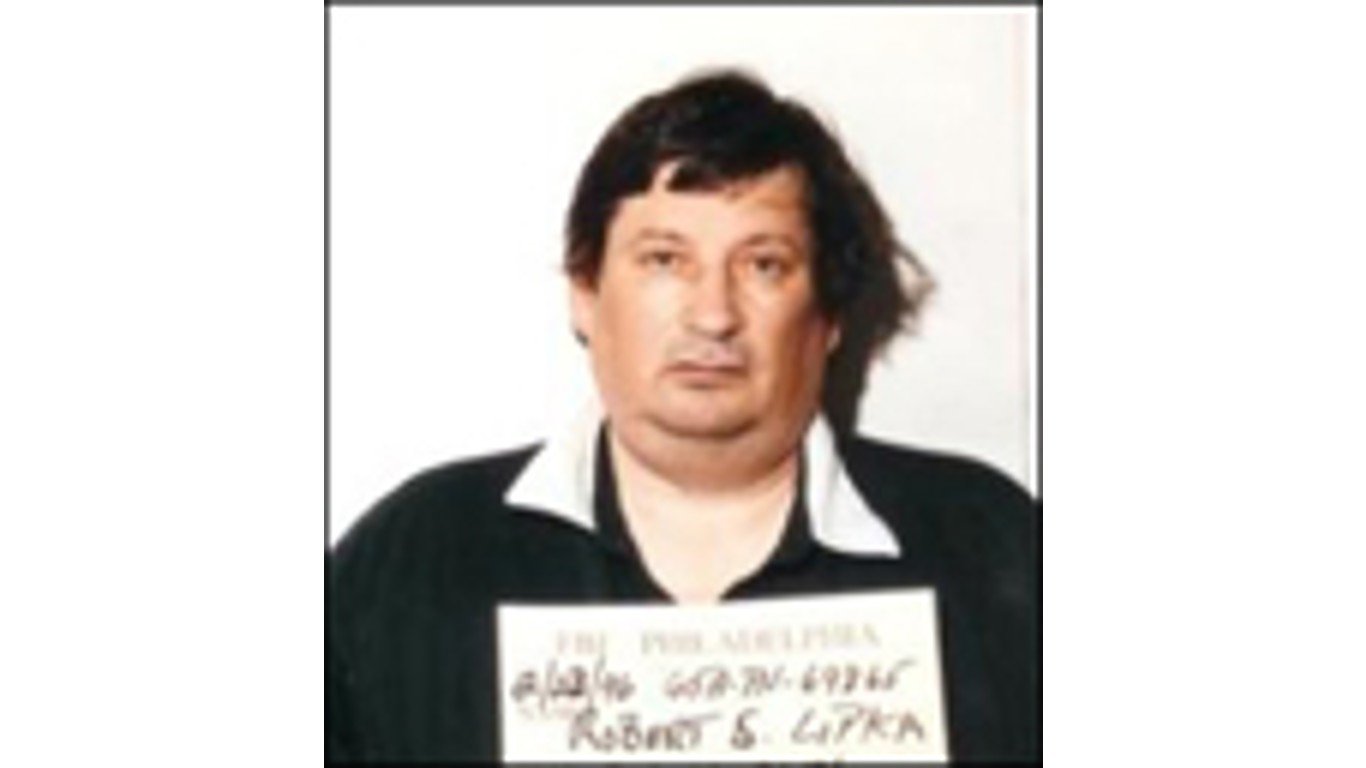
3. Robert Stephan Lipka
> Length of espionage activities: 30 years, 6 months
> Start date: Sept. 1965
> Arrest date: Feb. 23, 1996
> Spied for: Soviet Union
Lipka was an American who worked as a clerk for the National Security Agency from 1964 to 1967. Responsible for shredding or otherwise destroying documents, Lipka kept many of them and presented himself to the Soviet Embassy in D.C. offering to turn over a diverse array of of them in exchange for money. Lipka’s activities went undetected until the 1990s, when he was arrested and subsequently sentenced to 18 years in prison.

2. George Trofimoff
> Length of espionage activities: 31 years
> Start date: 1969
> Arrest date: June 14, 2000
> Spied for: Soviet Union
Trofimoff, a U.S. Army Reserve colonel, was convicted in 2001 for spying for the Soviet Union throughout much of the Cold War. Employed as a civilian in the U.S. Army’s intelligence division in Germany, he reportedly passed classified documents to the KGB in the ’70s and ’80s, reportedly motivated by financial gain. His life sentence, handed down in 2001, made him the highest-ranking U.S. military officer ever convicted of espionage.
[in-text-ad-2]
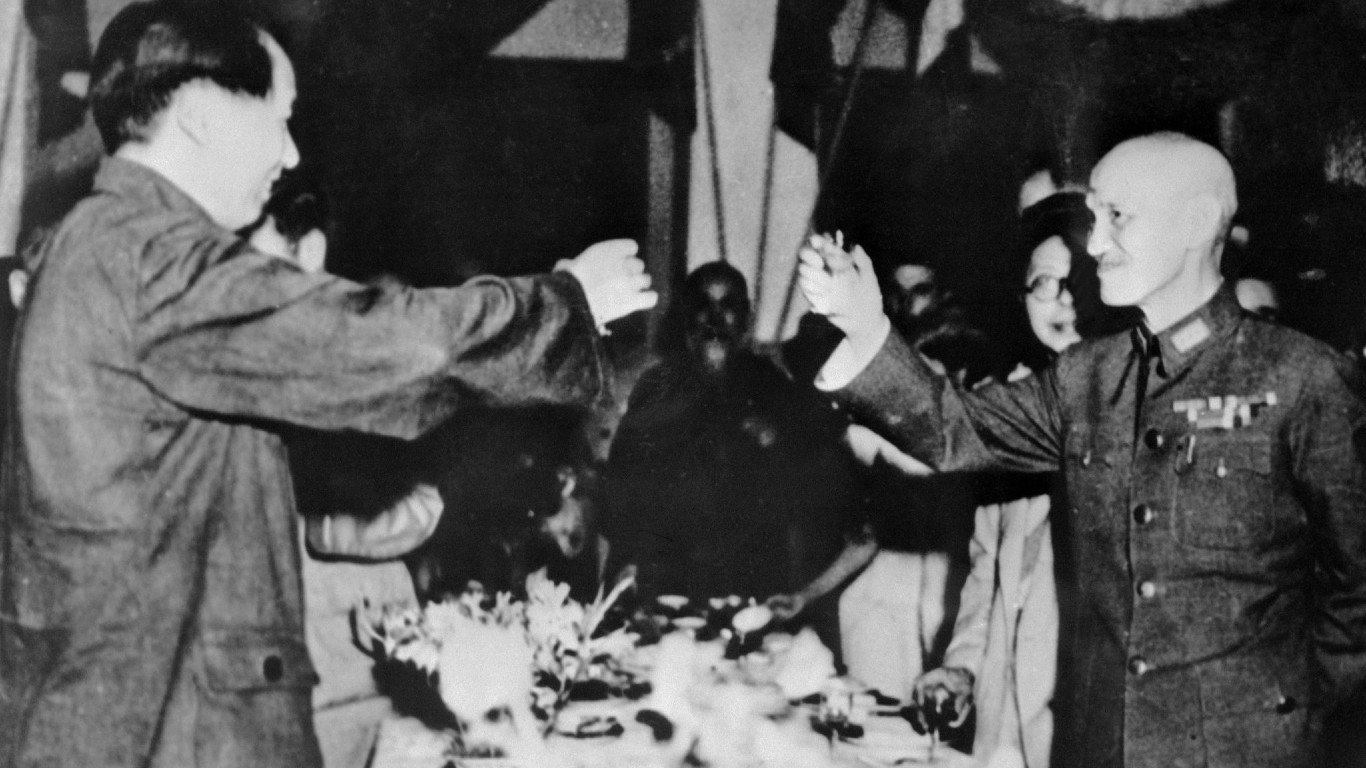
1. Larry Wu-Tai Chin
> Length of espionage activities: 33 years
> Start date: 1952
> Arrest date: Nov. 22, 1985
> Spied for: China
Larry Wu-Tai Chin was a Chinese-born linguist and CIA employee who was convicted of spying for the People’s Republic of China for more than 30 years, making him one of the most damaging spies in U.S. history. His activities led to significant information leaks about U.S strategies and policies, particularly those related to China. He committed suicide in his prison cell in 1986 before he could be sentenced.
Take This Retirement Quiz To Get Matched With A Financial Advisor (Sponsored)
Take the quiz below to get matched with a financial advisor today.
Each advisor has been vetted by SmartAsset and is held to a fiduciary standard to act in your best interests.
Here’s how it works:
1. Answer SmartAsset advisor match quiz
2. Review your pre-screened matches at your leisure. Check out the advisors’ profiles.
3. Speak with advisors at no cost to you. Have an introductory call on the phone or introduction in person and choose whom to work with in the future
Take the retirement quiz right here.
Thank you for reading! Have some feedback for us?
Contact the 24/7 Wall St. editorial team.
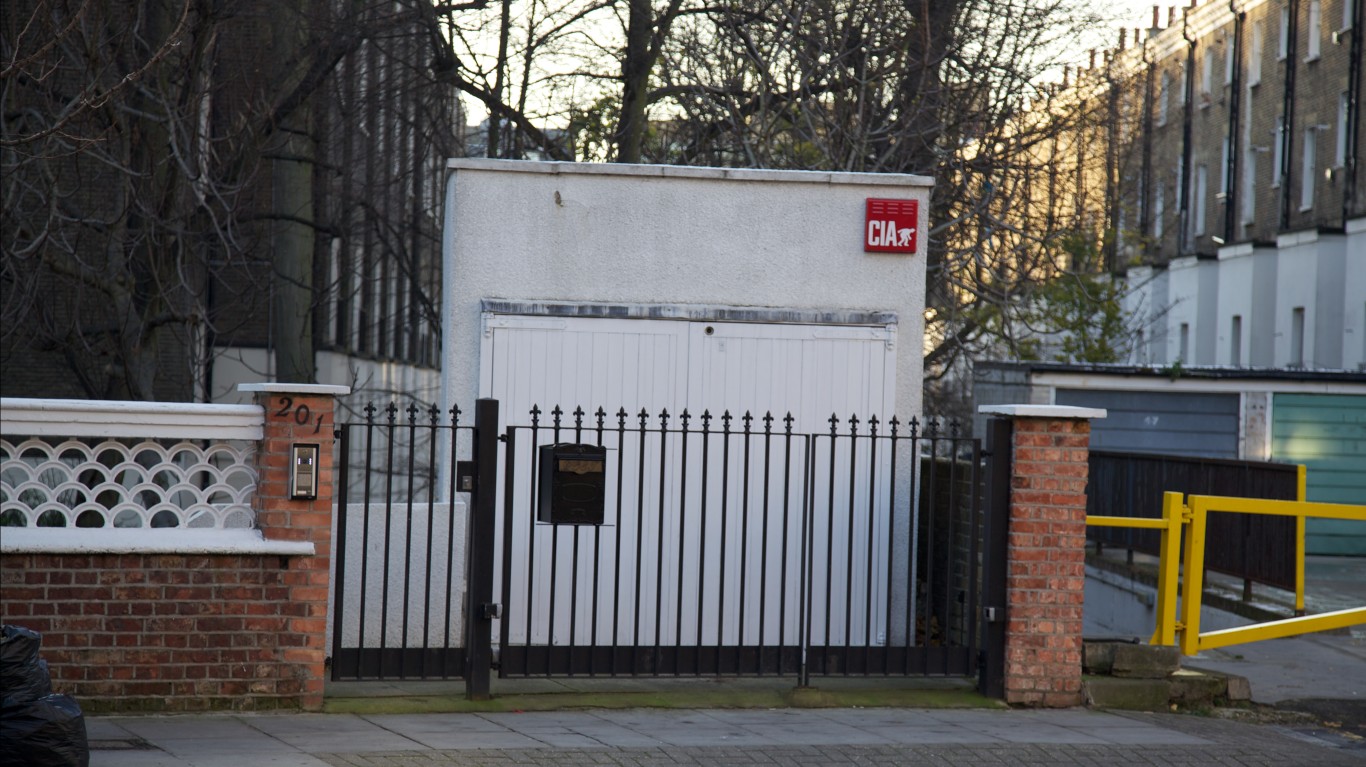
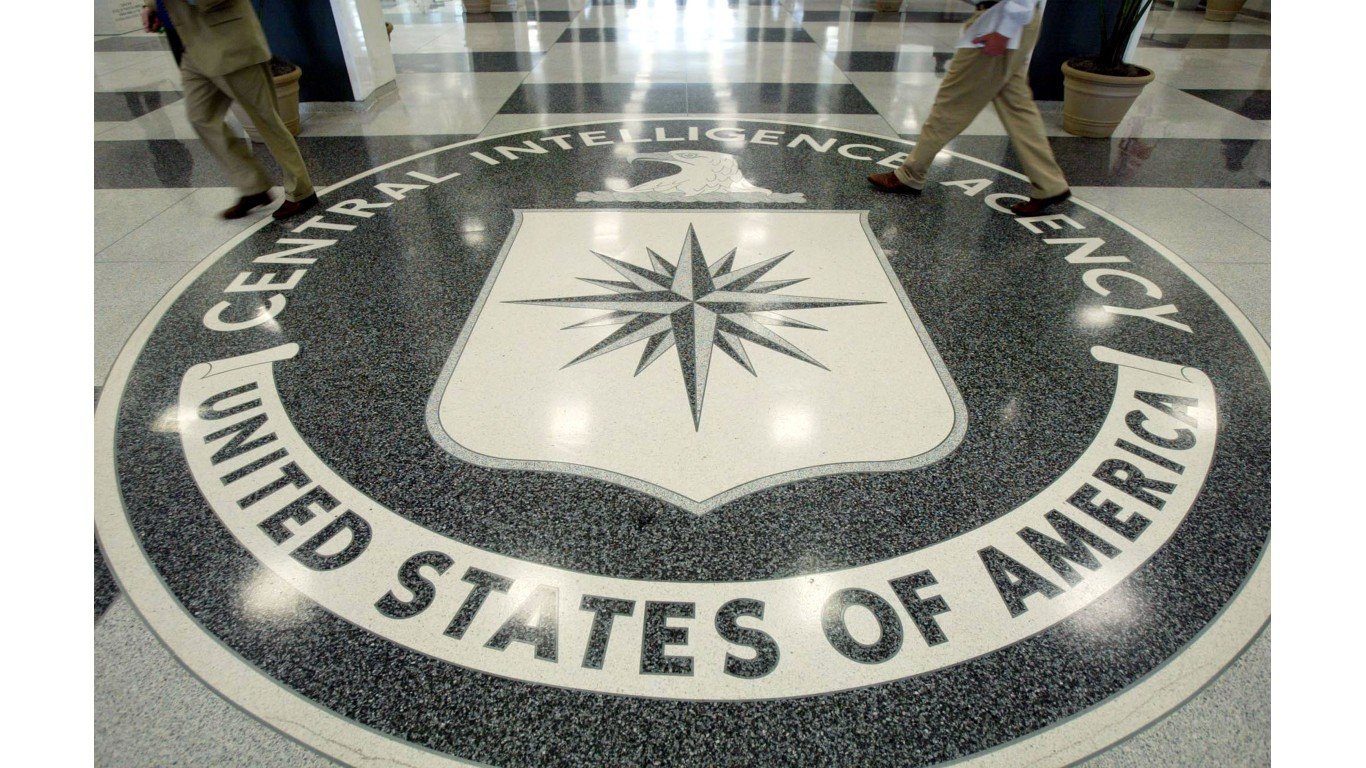 24/7 Wall St.
24/7 Wall St.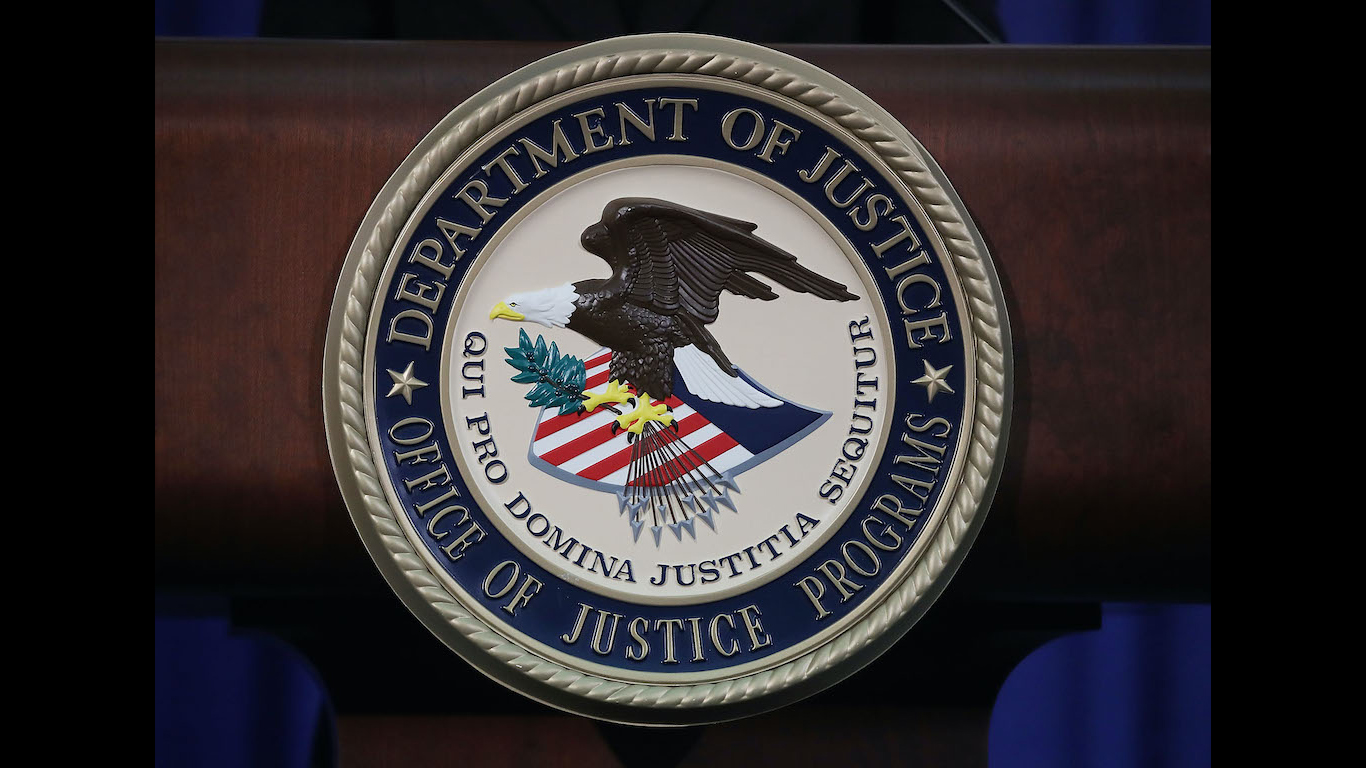 24/7 Wall St.
24/7 Wall St.

 24/7 Wall St.
24/7 Wall St.


